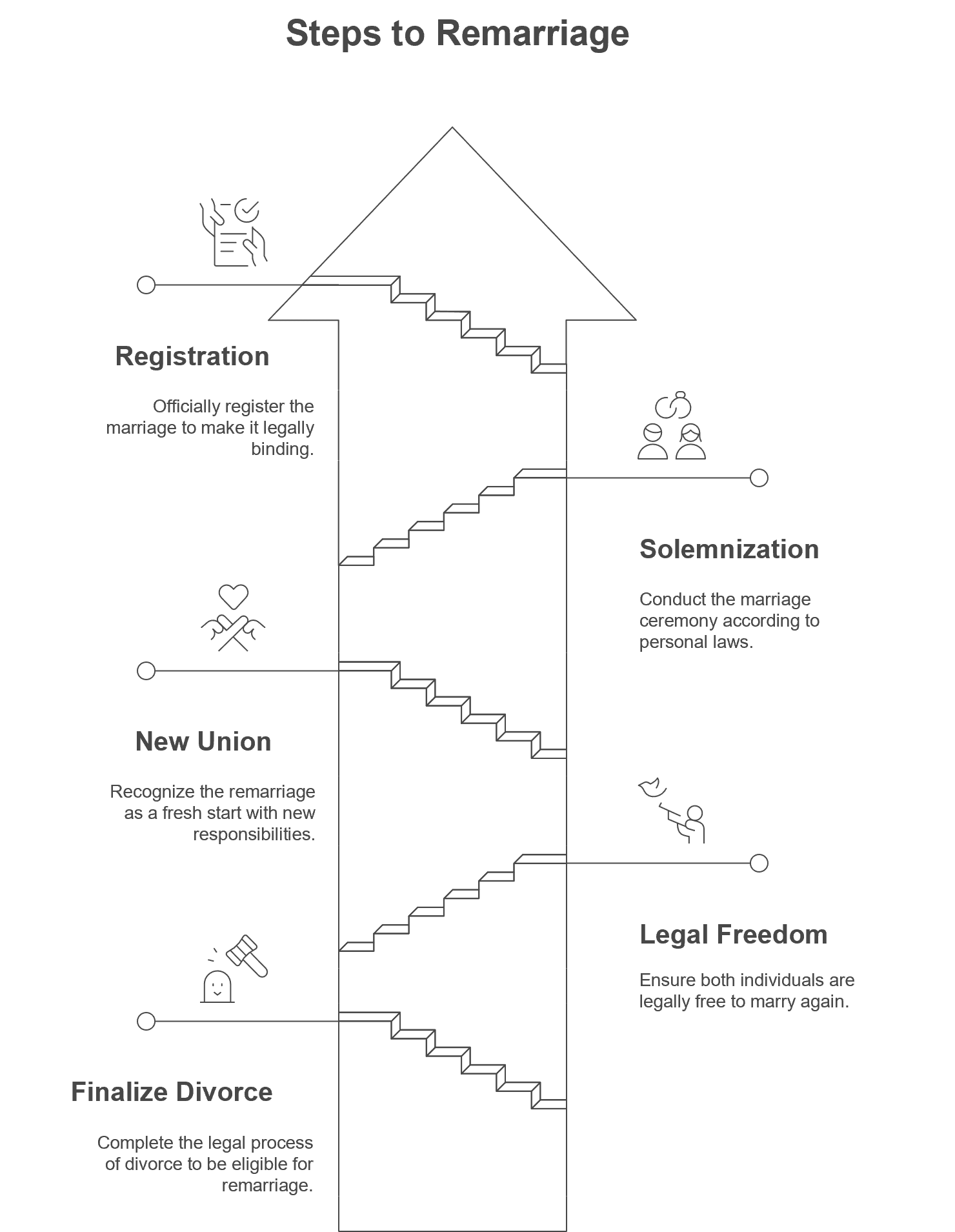Can a Divorce Be Cancelled in India? | Guide to Reconciliation
Divorce often raises many questions. One common query is, can a divorce be cancelled, especially after it has been initiated or finalized?
This question is especially relevant in India. Here, personal laws governing marriage and divorce are deeply connected with cultural and social norms.
Many individuals, after filing for divorce or even after a decree is granted, might have a change of heart. They wonder if there’s a legal way to reconcile and stop the divorce proceedings.
However, the legal reality in India is complex. There isn’t a simple “cancellation” button for a finalized divorce decree. Once a court finalizes it, it generally cannot be simply reversed or cancelled in the traditional sense.
The legal process aims to bring finality to marital disputes. While reconciliation is always encouraged, the methods for achieving it post-divorce are specific and legally defined.
This blog post will clarify these complexities. We’ll explore the various stages of divorce proceedings and the limited circumstances where a divorce can be effectively “undone.”
This includes withdrawing a petition, the intricacies of the appellate process, and the most common and legally sound method of remarriage. We will delve into the legal provisions and practical implications to provide a comprehensive understanding of navigating the aftermath of a divorce in India.
Looking for Guidance on Divorce or Reconciliation?
If you’re navigating the complexities of divorce — from withdrawing a petition to understanding if and how a divorce can be reversed — the right legal support matters.
Bhatla Law Firm offers experienced, compassionate counsel for individuals and couples dealing with divorce and related family matters. As a leading divorce lawyer in Delhi, we provide practical legal solutions tailored to your unique circumstances.
Contact us today for a confidential consultation.
Website: bhatlalawfirm.com | Email: info@bhatlalawfirm.com | Maps: Based in Delhi
Can a Divorce Be Cancelled? – Understanding the Finality of a Divorce Decree in India
In India, a divorce decree is a formal court order. It legally dissolves a marriage, marking the end of the marital bond between two individuals.
Once finalized, this decree carries significant legal weight. It changes the marital status of both parties from ‘married’ to ‘divorced.’
The finality of such a decree is crucial for legal certainty. It allows individuals to move forward without constant uncertainty about their marital status.
This is why the idea of simply “cancelling” a divorce decree, like cancelling a subscription, doesn’t align with Indian family law principles.
The legal system aims for a definitive resolution to matrimonial disputes. Allowing easy reversals of finalized decrees would create instability in personal relationships and legal records.
It’s important to understand that divorce, unlike a temporary separation, is a permanent dissolution of the marriage.
While emotions can change, the legal status, once formalized by a decree, is designed to be stable and irreversible through a simple administrative action.
This distinction is vital for anyone understanding their legal standing post-divorce in India. It also emphasizes the need for careful consideration and legal counsel throughout divorce proceedings, as the outcome is intended to be conclusive.
The legal framework does provide avenues for challenging a decree through appeals. However, these are distinct from a mere cancellation and are subject to specific legal grounds and procedures, which we will explore further.

When a Divorce Petition Can Be Withdrawn?
While a finalized divorce decree is largely irreversible, the situation is different before the court grants the final decree. During this period, there are provisions for withdrawing a divorce petition.
This offers a window for reconciliation if both parties have a change of heart. The possibility of withdrawal depends on the stage of the divorce process and the type of divorce sought.
Withdrawal in Mutual Consent Divorce Cases
Mutual consent divorce, under Section 13B of the Hindu Marriage Act, 1955, allows couples to seek divorce amicably.
The process typically involves two motions. The first motion is filed jointly, stating their intention to divorce and that they’ve lived separately for a specified period.
After the first motion, there’s a mandatory cooling-off period, usually six to eighteen months. This time is for reconsideration and exploring reconciliation.
During this period, either party can withdraw their consent. If one party does, the mutual consent divorce petition cannot proceed, and the court will dismiss it.
This withdrawal effectively “cancels” the divorce proceedings initiated under mutual consent. It’s a crucial safeguard against hasty decisions, giving couples ample opportunity to reconcile before the final decree.
If both parties reconcile, they can jointly apply to withdraw the petition, or simply not appear for the second motion, leading to dismissal.
Case Example (Mutual Consent Withdrawal): In the case of Smt. Sureshta Devi v. Om Prakash (1991 AIR 1904, 1991 SCR (2) 276), the Supreme Court held that consent must be subsisting at the time of the second motion. If consent is withdrawn by either party, the petition cannot be granted.
Remarriage after Mutual Consent Divorce Withdrawal: If the petition is withdrawn or dismissed, the marriage remains legally intact. Therefore, remarriage is not applicable as the original marriage was never dissolved.
Withdrawal in Contested Divorce Cases
In a contested divorce, one spouse files a petition against the other based on specific grounds (e.g., cruelty, desertion, adultery). The withdrawal process here is slightly different.
If the petitioner (the spouse who filed) wishes to withdraw, they can, provided certain conditions are met. If the respondent (the other spouse) hasn’t yet filed their written statement or counterclaim, the petitioner can generally withdraw unilaterally by filing an application.
The court usually grants such a request, leading to the dismissal of the divorce petition.
However, if the respondent has already filed a written statement or a counterclaim seeking relief (like divorce from their side), the petitioner cannot withdraw unilaterally. In this scenario, withdrawal would require the respondent’s consent, or the court might proceed with the counterclaim even if the original petition is withdrawn.
The court’s discretion is significant here, aiming to ensure justice for both parties. Thus, while withdrawal is possible in contested cases, it becomes more complex once proceedings advance and both parties actively participate.
The key takeaway is that the opportunity to withdraw a divorce petition exists primarily before the final decree is issued, offering a chance for couples to halt the legal process and explore reconciliation.
Case Example (Contested Divorce Withdrawal): While specific case law on unilateral withdrawal in contested divorce is less common due to the varied circumstances, courts generally uphold the principle that a petitioner can withdraw their petition before the respondent files a substantive reply or counterclaim, as there is no prejudice caused to the other party at that stage.
Remarriage after Contested Divorce Withdrawal: Similar to mutual consent, if a contested divorce petition is withdrawn or dismissed before a decree is granted, the marriage remains legally valid. Remarriage is therefore not applicable as the original marriage was never dissolved.
The Role of Appeals in ‘Reversing’ a Divorce
While a finalized divorce decree cannot be simply “cancelled,” there’s a legal mechanism to overturn its effect: the appellate process. An appeal isn’t a cancellation; it’s a challenge to the original divorce decree’s validity or correctness.
This avenue is typically used in contested divorce cases. One party, dissatisfied with the judgment, seeks a review by a higher court.
Understanding the Appellate Process
When a divorce decree is granted by a District Court or Family Court, the aggrieved party can appeal to the High Court within a specified period.
The High Court, as an appellate authority, reviews the lower court’s decision. This review is based on legal errors, factual misinterpretations, or procedural irregularities.
The appeal’s purpose is to determine if the lower court’s judgment was legally sound and just. It’s not a re-litigation of the entire case, but a scrutiny of the existing record for flaws.
Reconciliation During Appeal
An interesting scenario occurs when parties reconcile during an appeal. This often happens after the initial emotional turmoil of divorce proceedings has subsided, allowing for reflection.
If the husband and wife, previously at odds, now wish to live together again, they can inform the appellate court of their reconciliation.
In such cases, the High Court may set aside the lower court’s divorce decree based on their mutual settlement. This recognizes the importance of preserving marital ties and promoting family harmony.
This is a significant legal development. It effectively nullifies the divorce decree, restoring the parties’ marital status. This action by the appellate court is not an administrative “cancellation.”
Instead, it’s an exercise of judicial power to rectify a situation where the underlying dispute (the breakdown of the marriage) no longer exists due to reconciliation. The court’s decision to set aside the decree is based on the changed circumstances and the parties’ renewed intention to continue their marital relationship.
Case Example (Reconciliation during Appeal): In K. Srinivas Rao v. D.A. Deepa (2013) 5 SCC 226, the Supreme Court emphasized the importance of reconciliation in matrimonial disputes and encouraged courts to explore such possibilities, even during the appellate stage. While not directly a case of setting aside a decree due to reconciliation during appeal, it underscores the judicial inclination towards preserving marriages where possible.
Distinction from Cancellation
It’s vital to distinguish this process from a simple cancellation. Cancellation implies undoing an action as if it never happened.
In an appeal leading to a divorce decree being set aside, the decree was validly passed by the lower court at the time. The appellate court’s decision is a new judicial act that supersedes the lower court’s order due to a subsequent development (reconciliation).
This mechanism provides a legal pathway for couples who genuinely reconcile after a contested divorce decree has been issued. It allows them to legally restore their marital status without immediate remarriage. However, it’s a complex legal process requiring proper legal representation and adherence to appellate procedures.
Remarriage after Appeal Overturns Divorce: If the appellate court sets aside the divorce decree, the original marriage is legally reinstated. Therefore, remarriage is not necessary as the parties are considered to have remained married throughout. If they wish to solemnize their reunion, they can do so through a fresh marriage ceremony, but it is not a legal requirement for their marital status.
Remarriage: The Legal Path to Reunion
When a divorce decree is finalized, the most straightforward and legally sound way for former spouses to reunite is through remarriage. This is not a cancellation of the previous divorce, but rather the formation of a new marital bond.
Once a divorce is absolute, both individuals are legally free to marry anyone, including each other. This new marriage is treated as a fresh union, with all the legal implications and responsibilities that come with it.
It’s important to understand that this is distinct from attempting to
cancel the old divorce. The previous marriage has been legally dissolved, and a new one is being created.
Process of Remarriage: The process for remarriage is the same as for any first marriage, adhering to the personal laws applicable to the individuals (e.g., Hindu Marriage Act, Special Marriage Act). This typically involves solemnization of the marriage and subsequent registration.
Case Example (Remarriage): While there isn’t a specific case law on remarriage after divorce that needs citation, the legal principle is enshrined in various personal laws. For instance, Section 15 of the Hindu Marriage Act, 1955 explicitly states that when a marriage is dissolved by a decree of divorce and there is no right of appeal against the decree, or if there is such a right of appeal, the time for appealing has expired without an appeal having been presented, or an appeal has been presented but has been dismissed, it shall be lawful for either party to marry again.

Mutual Consent Divorce: Understanding its Finality
Mutual consent divorce, as discussed earlier, offers a path for amicable separation. However, once the decree for mutual consent divorce is issued, its finality is generally absolute.
There is typically no provision in law for withdrawing or cancelling a mutual consent divorce after the decree has been granted. The cooling-off period is specifically designed for reconsideration, and once that period passes and the decree is issued, the legal dissolution is complete.
This emphasizes the importance of careful consideration during the cooling-off period. Any change of heart must occur before the final decree is passed.
Case Example (Finality of Mutual Consent Divorce): The finality of a mutual consent divorce decree, once passed, is well-established. Courts generally do not entertain applications for setting aside such decrees unless there is evidence of fraud, misrepresentation, or coercion in obtaining the consent. For example, in Smruti v. Dipti Ranjan (2018) SCC OnLine Ori 106, the Orissa High Court reiterated that a decree of divorce by mutual consent cannot be set aside on mere change of mind, unless there is a strong case of fraud or misrepresentation.
Seeking Legal Counsel
Navigating the complexities of divorce law in India requires expert guidance. The nuances of withdrawing petitions, understanding appellate processes, and the implications of remarriage can be intricate.
It is always advisable to consult with a qualified family lawyer in India. A lawyer can provide personalized advice based on your specific circumstances, ensuring you make informed decisions.
They can help you understand your legal options, the procedures involved, and the potential outcomes, guiding you through every step of the process.
Conclusion
So, can a divorce be cancelled? Not in the conventional sense. But Indian law provides structured avenues like withdrawal, appeal, and remarriage for those seeking to restore marital ties.
A divorce petition can be withdrawn before the decree is granted, offering a chance for reconciliation.
In contested cases, an appeal to a higher court can lead to the setting aside of a divorce decree if the parties reconcile during the appellate process. This is a judicial overturning, not a simple cancellation.
For couples who wish to reunite after a finalized divorce, remarriage is the clear and legally recognized path. This establishes a new marital bond.
Understanding these legal nuances is essential. The Indian legal system encourages reconciliation but also values the finality of judicial pronouncements. Always seek professional legal advice to navigate these complex matters effectively.
Looking for Guidance on Divorce or Reconciliation?
If you’re navigating the complexities of divorce — from withdrawing a petition to understanding if and how a divorce can be reversed — the right legal support matters.
Bhatla Law Firm offers experienced, compassionate counsel for individuals and couples dealing with divorce and related family matters. As a leading divorce lawyer in Delhi, we provide practical legal solutions tailored to your unique circumstances.
Contact us today for a confidential consultation.
Website: bhatlalawfirm.com | Email: info@bhatlalawfirm.com | Maps: Based in Delhi

